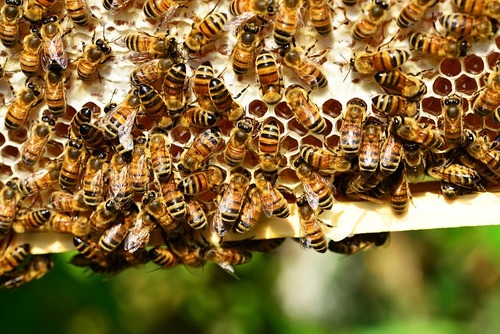Short answer
Most of the honey you buy in stores has zero benefits and poses the same health risks as refined sugar does. However, if you get your honey locally, there are a few associated health benefits.
Recommended Alternative
A fairly even ratio of beneficial and harmful qualities. Moderation is important. Very general topics that can lean towards both sides of the spectrum will be placed here as well. Rice, for example, can be good or bad depending on the type.
View Full Grading System
Category 'A'
Very healthy and numerous health benefits. Side effects are rare. Things rated an 'A+' are typically necessary for survival (for example, water).
Very healthy and numerous health benefits. A few harmful qualities may be associated, but only under certain circumstances such as an allergic reaction.
Very healthy and numerous health benefits. Harmful qualities may be associated, but aren't usually serious.
It is important to note that even the best things in life can become bad in immoderate amounts. So, although something may be rated an 'A+', overconsumption/overdoing can bring unwanted effects.
Category 'B'
Very beneficial to your health. Things rated a 'B+' may have a few harmful qualities to pay attention to.
Overall beneficial to your health. Things rated a 'B' may have some harmful qualities to pay attention to.
More beneficial to your health than not. However, harmful qualities are most likely associated and shouldn't be overlooked.
The main difference between category 'A' and category 'B' is the harmful qualities typically present in 'B' items. Serious side effects are usually uncommon, but are still possible and should be taken note of.
Category 'C'
Both beneficial and harmful qualities associated. Things rated a 'C+' are typically a bit more on the beneficial side. Still, moderation is important.
A fairly even ratio of beneficial and harmful qualities. Moderation is important. Very general topics that can lean towards both sides of the spectrum will be placed here as well. Rice, for example, can be good or bad depending on the type.
More harmful than beneficial. Side effects are common, especially when consumed/done excessively. Moderation is very important.
Category 'C' usually denotes to both good and bad qualities. When it comes to this category, it is important to keep this word in mind: moderation.
Category 'D'
Harmful to your health. Although benefits may be associated, the bad most likely outweighs the good. Moderation is very important.
Harmful to your health. A few benefits may be associated, but the bad outweighs the good. Moderation is extremely important.
Harmful to your health. Very few, if any, benefits are present. Things in this category should be avoided as much as possible.
Category 'D' is typically for things that are more harmful than beneficial. While consuming/doing something unhealthy once in a blue moon shouldn't hurt, we definitely recommend eliminating 'D' items as a regular part of your routine/diet.
Category 'F'
Category 'F' is for things that fail to bring anything beneficial to the table, and are very harmful to your health. We recommend completely avoiding anything in this category. Long-term side effects of 'F' items are usually very serious.
Category 'N'
'N' stands for neutral. Things placed into this category are generally (a) neither good nor bad for you, or (b) lack the necessary evidence to reach any conclusions.
Long answer
Honey is about 55% fructose and can actually pose all of the same health risks table sugar does. In addition to putting you at a higher risk for obesity, heart disease, and other sugar-related illnesses, honey actually contains more calories than refined sugar (one teaspoon of honey having about 22 calories). Also, honey even in its raw, unrefined state contains only trace vitamins and minerals, with just about 2% of the stuff including them. So, as a food, honey may be only slightly better than regular refined sugar.
However, apart from a lack of nutritional benefits, locally produced honey does have other uses that refined sugar simply does not. For one, honey has long been used as a cough suppressant. This works because honey produces a protective coating that soothes the throat. Honey has also been used to treat wounds as it is full of antibacterial, antioxidant, and anti-fungal properties. Two other uses for honey may be for reducing herpes symptoms and for increasing immunity to allergies. In the last example, pollen contains allergens and when consuming locally produced honey, very small amounts of these allergens are introduced into your system, thus leading to increased immunity in the long-term.
However, don't go rushing to buy honey for these wonderful medical benefits. These only come into play if you are buying locally produced honey. With over 75% of the honey sold in American supermarkets being highly processed, chances are all of these benefits have been eliminated, leaving you basically with nothing but sugar. One caveat about honey - there is a risk of infant botulism involved, so it is best to not give to children under one year old.
Possible long-term side effects
- heart disease
-
obesity
-
hyperglycemia
-
diabetes
Ingredients to be aware of
- excessive amounts of fructose
Benefits
- cough suppressant
-
treats wounds
-
may fight herpes symptoms
-
may increase allergy immunity
Healthier alternatives
- pure maple syrup
-
coconut nectar
Our Wellness Pick
(what is this?)
Wedderspoon Manuka Honey
- Raw, premium quality
- High KFactor 16
- Unpasteurized purity
- New Zealand origin
- Traceable sourcing
Learn More!
Please turn your Ad Blocker off to see this content. Thank you!
Thank you for your feedback!
Written by Jeff Volling
Published on: 12-28-2015
Last updated: 12-15-2023
Thank you for your feedback!
Written by Jeff Volling
Published on: 12-28-2015
Last updated: 12-15-2023

 Approved by
Approved by 















